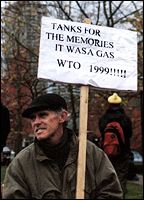Image: Silja Talvi
The Battle of Seattle was recreated in miniature on Thursday as hundreds of demonstrators took to the streets to commemorate last year’s massive anti-WTO protests — and police hauled dozens of them off to jail.
Early in the day, an estimated 2,000 activists — including sea turtle-costumed environmentalists, sign-waving students, and a dozen topless Lesbian Avengers — marched peacefully through downtown. Seattle police, who last year worked the streets in full body armor, flashed a friendlier face this time, wearing regular uniforms and name tags despite the vandalization of nine Starbucks outlets the previous day and e-mailed death threats received at City Hall.
Seattle’s new police chief, Gil Kerlikowske, made a point of chatting up protesters and even provided a motorcycle escort for a cardboard anniversary cake dedicated to Mayor Paul Schell for “helping Seattle expose the WTO to the world.”
But tensions flared as evening approached, when riot gear-clad police attempted to force the dancing and singing activists off the streets near Fourth Avenue and Pine Street — ground zero of last year’s chaos. After negotiations, most protesters moved on to either a candlelight vigil or to a celebration-cum-public discussion at the Labor Temple.
A small group, however, soon returned, blocking a major intersection and reportedly throwing rocks and bottles at police. After three warnings, police moved in with pepper spray. Some 140 people were arrested, including an Associated Press photographer and a few people who said they were just innocent bystanders.
“Peaceful free speech is something we encourage in Seattle, but freedom of speech is not a grant to break the law,” said Dick Lilly, spokesman for Mayor Schell. “It’s fair to say that since Seattle, LA, Philadelphia, DC, and Prague, an element of the anti-globalization … groups is fairly deliberate in [its] attempts to provoke local government into police action in order to buy sympathy for their cause.”
Still, it was small-scale stuff compared to last Nov. 30, when Seattle’s streets erupted into chaos as police broke up clumps of protesters with tear gas and rubber bullets, and agitators smashed windows and defaced some downtown stores. Full-scale protests and mass arrests, abetted by the National Guard, continued for days, culminating in 600 arrests and an estimated $3 million in property damage.
 |
Since then, the Seattle police and Mayor Schell have had to defend themselves against a flurry of reports and investigations denouncing their response to the protests as excessively heavy-handed. A commission appointed by the Seattle City Council released a report in September which found that many demonstrators were not given adequate warning regarding the use of chemical irritants and other forceful methods, and that large-scale arrests — not chemical irritants — should have been the first tactic tried in response to “unlawful assemblies.” Amnesty International has also raised concerns about human rights violations of protesters in custody, while the American Civil Liberties Union issued a 95-page report blasting the city and the SPD for grossly mishandling WTO-related protests and violating demonstrators’ civil liberties.
(The SPD’s own assessment of its conduct admits some mistakes, but defends its use of chemical agents.)
More than 60 damage claims and lawsuits have been filed against the city, including a federal class-action case filed by Trial Lawyers for Public Justice in October. The suit charges that the city’s creation of a “no-protest zone” during the WTO conference constituted a violation of the First Amendment.
Yesterday, protesters converged at noontime, en masse, at the City Clerk’s office to file claims against the city for injuries and constitutional violations suffered during last year’s demonstrations.
“We’re asking for our city to make changes in the way that they respond to us when we speak out,” said Erica Kay, the group’s spokesperson.












